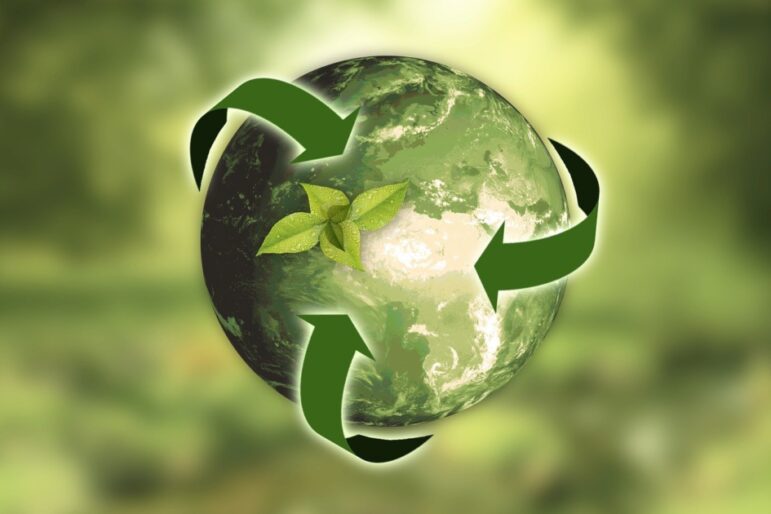Sustainable cleaning is on almost everyone’s minds as we continue to strive to lower our environmental impact. As we evolve from “green cleaning” to longer, more meaningful practices, sustainability is becoming more important for cleaning companies and their customers.
If we look at Google Trends as a reference, which tells us how often a search term is used over time, we see that in January 2018 “sustainable goods” was only moderately searched, with Google Trends giving it a rating of “25.” By September 2020, however, that number had jumped to 55, and by January 2023, it was rated 100.
This tells us that in five years, the interest in sustainable goods jumped dramatically, and that shift has happened in the professional cleaning industry as well; over the past five years, interest in sustainable cleaning solutions has become a priority.
Before going further, we need to answer one question: are green cleaning products and sustainable cleaning products the same? The answer is yes – and no.
A green cleaning solution is manufactured specifically to have a reduced impact on people and the environment compared to other products used for the same or similar purpose.
Sustainable cleaning solutions, on the other hand, are often green (having a reduced impact on the environment), however, one of their primary goals is that they help reduce the use of natural resources by using readily available and readily renewable ingredients.
While not a cleaning product, a good example of a sustainable product is bamboo. Bamboo is used in flooring, building materials, and furniture, among other products. It is very easy to grow, is grown worldwide, and is fast growing, making it very sustainable. As a bonus, it is resistant to many pests and diseases, so pesticides are often not needed.
Citric acid, now used in many residential and commercial cleaning solutions, is a good example of a sustainable product. According to Hannah Johannes, marketing director for ProNatural Brands, marketers of citric acid cleaning, sanitizing, and disinfecting solutions. “Typically, these [cleaners] are referred to as ‘citric-acid-based’ cleaning solutions, [because] the primary ingredients in these products are usually one or a combination of lemons, limes, oranges, and even pineapples, grown abundantly worldwide.”
She adds that these products have been used in cleaning solutions for centuries and during that time, have proven their value, their effectiveness, and safety.
Further, because they are naturally nontoxic and biodegradable, they are widely used in the food industry and various other industries such as pharmaceutical, biomedical, textile, and leather industries, according to a recent report.
RELATED: Evolving from green cleaning to sustainability
Why is sustainability so important in the cleaning industry?
While green cleaning took centre stage in the professional cleaning industry for the last part of the 20th century, in the 21st century, sustainable products made from readily renewable ingredients are now getting most of the attention.
The reasons for this are many, according to Johannes. Among them are the facts that these products:
- Help us reduce our impact on the environment.
- Safeguard the natural resource needs of future generations.
- Use resources more efficiently (there is less waste).
- Protect human health.
- Reduce costs and improve profits.
- Increase our ability to withstand the negative impacts of climate change.
“In other words, the use of sustainable cleaning solutions has gone from a ‘nice to have’ to an essential business practice.”
The use of sustainable cleaning products has become a marketing tool for commercial cleaning companies. Most all facilities in Canada are now under pressure to operate more sustainably and are looking to their suppliers and contractors to support that approach.
This means, when hiring a cleaning contractor, instead of just focusing on price, facility owners and managers now want to know:
- What products will be used to clean their building?
- What ingredients or materials are used to make these products?
- Are these products renewable, sustainable, and biodegradable?
- Will they help us achieve our own sustainability goals?
- Are they high performing?
- Do they have a reduced impact on health and the environment?
- Will they help us reduce cleaning and operating costs?
“These are big questions that large cleaning contractors, as well as leading manufacturers in the professional cleaning industry, are already being asked,” says Johannes. “As we move forward, we can expect these questions to be asked by many more end-customers and potential customers.”
To be able to answer these questions, “your goal as a cleaning contractor is to use products that are not only safe and effective but also sustainable,” she adds. “This is the future in the professional cleaning industry.”
Robert Kravitz is a frequent writer for the professional cleaning industry. He can be reached at robert.kravitz@outlook.com.









